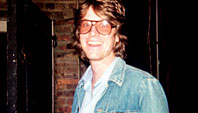

The year is 1979 and while 19-year-old Shane may be pumping gas in a dead-end New Jersey town, that doesn’t stop him from-you guessed it-yearning for the glamorous night life of glistening Manhattan, just the way Brooklyn boy John Travolta did in “Saturday Night Fever.” Those words come not from Rubell himself but the film’s protagonist, Shane O’Shea (Ryan Phillippe). Sure, Rubell skimmed money off the top, handed out drugs by the handful and baldly propositioned the male help, but, hey, this was a guy with a dream, a dream of “the best damn party in the world, a party that would last forever.” Myers plays Rubell as a kind of dissolute Andy Hardy: bad, maybe, but not evil-someone who kept the rabble out because the nephew of the king of Saudi Arabia was counting on him to uphold standards.

Granted that there’s not a whole lot of competition, Myers’ wistful performance remains the best thing about the film. Rubell himself is played, in a departure from the norm, by comic Mike Myers, best known in recent years as Austin Powers, International Man of Mystery. In fact, Rubell, who died a decade ago, had an involved partner named Ian Schrager, currently a successful hotelier, whose name and influence are never so much as mentioned. Helping to make the film’s treatment of that celebrated club even less accurate than it might have been was the decision to portray Studio 54 as completely Steve Rubell’s enterprise.
#STUDIO 54 BUSBOY PRO#
Imagine a lame “Love Boat” episode garnished with strictly pro forma drugs and sex and you’ll get the picture. Not only is Christopher’s “54" an unconvincing portrait of a particular moment in time, it’s also completely uninspired dramatically. Unlike writer-director Whit Stillman, who managed to infuse his own wry sensibility onto the nightclub scene in “The Last Days of Disco,” first-time filmmaker Mark Christopher is as phobic about originality as a club doorman would be about a tourist in a polyester plaid leisure suit. If the real 54 was this lacking in excitement and pizazz, it’s a wonder all its patrons didn’t fall asleep once they’d gotten inside the door. If you’ve never understood why people begged, wheedled and pleaded to get past the velvet rope and into the celebrated discos of the 1970s, don’t look to “54" to enlighten you.ĭecadence has rarely looked so pathetic, lethargic and dispiriting as it does in this listless film, based very loosely on the story of Manhattan’s celebrated Studio 54 and its reigning spirit, Steve Rubell.


 0 kommentar(er)
0 kommentar(er)
